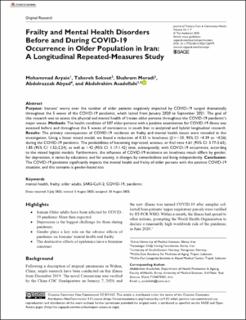Frailty and Mental Health Disorders Before and During COVID-19 Occurrence in Older Population in Iran: A Longitudinal Repeated-Measures Study
Peer reviewed, Journal article
Published version
Permanent lenke
https://hdl.handle.net/11250/3038724Utgivelsesdato
2022Metadata
Vis full innførselSamlinger
Originalversjon
Aryaie, M., Sokout, T., Moradi, S., Abyad, A. & Asadollahi, A. (2022). Frailty and Mental Health Disorders Before and During COVID-19 Occurrence in Older Population in Iran: A Longitudinal Repeated-Measures Study. Journal of Primary Care & Community Health, 13, 1-7. https://doi.org/10.1177/21501319221126979Sammendrag
Purpose: Iranians’ worry over the number of older patients negatively impacted by COVID-19 surged dramatically throughout the 5 waves of the COVID-19 pandemic, which lasted from January 2020 to September 2021. The goal of this research was to assess the physical and mental health of Iranian older persons throughout the COVID-19 pandemic’s major waves.
Methods: The health condition of 507 older persons with a positive examination for COVID-19 illness was assessed before and throughout the 5 waves of coronavirus in south Iran in analytical and hybrid longitudinal research.
Results: The primary consequences of COVID-19 incidence on frailty and mental health issues were revealed in this investigation. Using a linear mixed model, we found a reduction of 0.33 in loneliness (β = −.33, 95% CI −0.39 to −0.26) during the COVID-19 pandemic. The probabilities of becoming depressed, anxious, or frail rose 4.61 (95% CI: 3.77-5.63), 1.85 (95% CI: 1.52-2.24), as well as 1.42 (95% CI: 1.17-1.42) time, subsequently, with COVID-19 occurrence, according to the mixed logistic models. Furthermore, the influence of COVID-19 incidence on loneliness result differs by gender; for depression, it varies by education; and for anxiety, it changes by comorbidities and living independently.
Conclusion: The COVID-19 pandemic significantly impacts the mental health and frailty of older persons with the positive COVID-19 situation, and this scenario is gender-based too.

